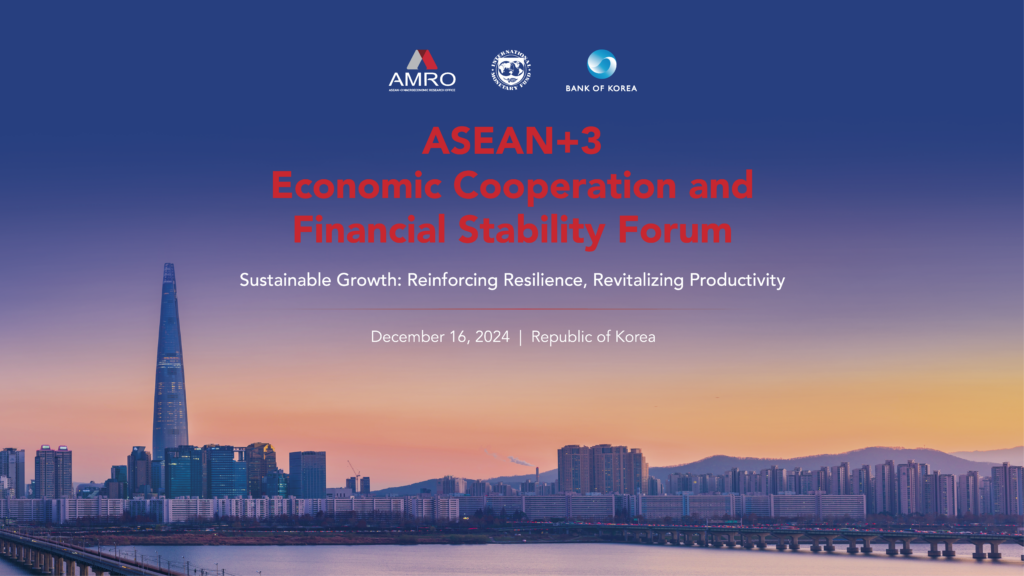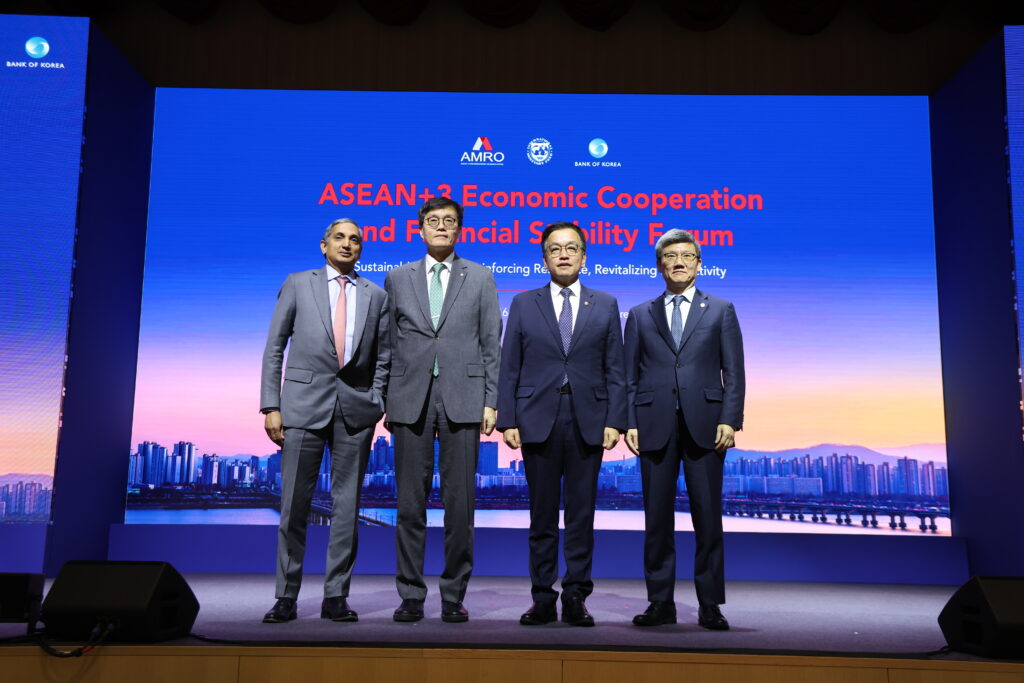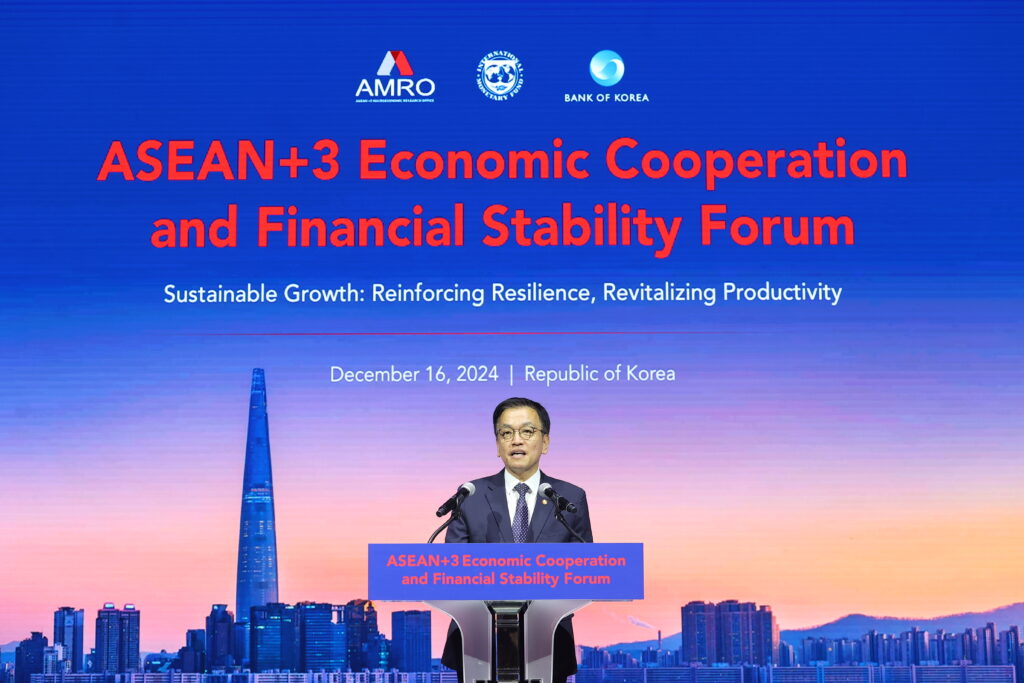
SEOUL, December 16, 2024 – The ASEAN+3 Macroeconomic Research Office (AMRO) today held the ASEAN+3 Economic Cooperation and Financial Stability Forum (AMRO Forum) in the capital city of Korea, in collaboration with the International Monetary Fund (IMF) and Bank of Korea (BOK). Centered on the theme “Sustainable Growth: Reinforcing Resilience, Revitalizing Productivity,” the third edition of the AMRO Forum gathered policymakers, academics, and experts from multilateral institutions to discuss evolving economic challenges affecting the ASEAN+3 region and to explore potential solutions.
AMRO Director Kouqing Li jointly opened the Forum with Korea Deputy Prime Minister and Minister of Economy and Finance Sang-mok Choi, Asian Development Bank President Masatsugu Asakawa, and IMF Asia and Pacific Department Director Krishna Srinivasan.
In his opening remarks, Mr. Li emphasized the region’s global significance, stating, “Nearly five years after the onset of COVID-19 pandemic and multiple shocks, the ASEAN+3 region has demonstrated remarkable resilience. While ASEAN+3 is expected to remain the world’s fastest-growing region, our longer-term prospects face formidable challenges, including aging populations, climate change risks, heightened geopolitical tensions, and growing geoeconomic fragmentation.”
He underlined three priorities for the region to adapt to the long-term challenges. “First, we must prepare by rebuilding policy space and enhancing policy flexibility to respond to shocks. Second, it is crucial to revitalize long-term growth by embracing technological advances and adopting innovative strategies. Finally, we must intensify regional cooperation to navigate the complexities of an increasingly fragmented world.”
Recognizing the gradual improvement in global economic growth alongside rising concerns about downside risks, such as the changing global trade landscape, Deputy Prime Minister Choi expressed his hope that the AMRO Forum would serve as a valuable platform to discuss the future policy direction of ASEAN+3 members. He highlighted three key points, “First, given closer ties between countries, stronger financial and economic cooperation is crucial to contain short-term risks. Second, the fundamental solution to mid- to long-term risks, lies in boosting growth potential through economic structural reform. Lastly, sustainable growth requires efforts to establish inclusive laws and institutions.”
Mr. Srinivasan of the IMF emphasized two key policy areas in his opening remarks to rebuild Asia’s resilience further and provide impetus for stronger medium-term growth. “First, macroeconomic policies should be geared to maintain resilience. This would require rebuilding fiscal space and buffers to be able to respond to new eventual shocks. Monetary policy would need to be agile, easing where slack remains, while remaining cautious of potential headwinds from higher-for-longer rates in advanced economies. Second, the region must address looming structural challenges to maintain its growth momentum. In particular, shifting production and exports toward high productivity modern services can provide durable growth dividends,” he said.
Held alongside the ASEAN+3 Finance and Central Bank Deputies’ Meeting, the forum’s keynote speakers and panelists shared valuable insights and presented initiatives aimed at fostering sustainable economic growth in the ASEAN+3 region over the medium and long term.
During the morning session, participants gained insights from keynote addresses by Indonesia Finance Minister Sri Mulyani Indrawati and Mr. Srinivasan that set the tone for an engaging panel discussion on the region’s near-term macroeconomic outlook and policy priorities to safeguard macro-financial stability and support sustained growth.
The afternoon session will feature keynote speeches by World Bank Chief Economist and Senior Vice President for Development Economics Indermit Gill, and 2024 Nobel Prize Laureate in Economics and Professor at MIT Sloan School of Management Simon Johnson. Panelists in the afternoon will delve into the region’s long-term growth prospects and challenges, focusing on strategies to unlock its growth potential and foster resilience.
AMRO extends its sincere appreciation to BOK and IMF for their invaluable support and partnership in ensuring the success of the 3rd AMRO Forum.
To watch the AMRO Forum online, please visit here. Selected remarks from the Opening Session and keynote speeches will be available on the AMRO website after the Forum concludes.
About AMRO
The ASEAN+3 Macroeconomic Research Office (AMRO) is an international organization established to contribute toward securing macroeconomic and financial resilience and stability of the ASEAN+3 region, comprising 10 members of the Association of Southeast Asian Nations (ASEAN) and China; Hong Kong, China; Japan; and Korea. AMRO’s mandate is to conduct macroeconomic surveillance, support regional financial arrangements, and provide technical assistance to the members. In addition, AMRO also serves as a regional knowledge hub and provides support to ASEAN+3 financial cooperation.

(From right to left) AMRO Director Kouqing Li, Korea Deputy Prime Minister and Minister of Economy and Finance Sang-mok Choi, Bank of Korea Governor Chang-yong Rhee and IMF Asia and Pacific Department Director Krishna Srinivasan at the AMRO Forum.

Korea Deputy Prime Minister and Minister of Economy and Finance Sang-mok Choi delivers remarks at the opening of the AMRO Forum.
